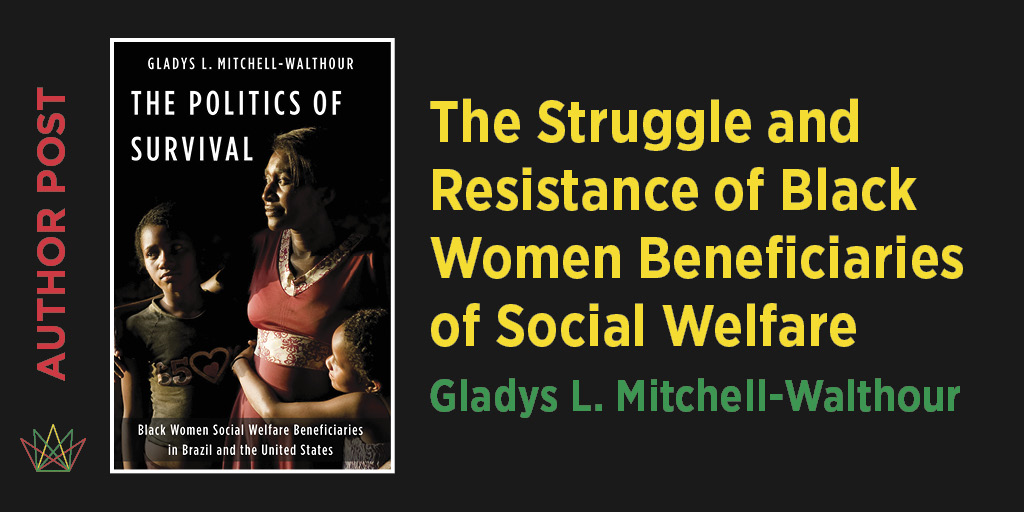The Struggle and Resistance of Black Women Beneficiaries of Social Welfare
Gladys L. Mitchell-Walthour

On September 27, 2022, Renée Graham, a Boston Globe columnist, published a piece entitled “Brett Favre, Welfare Queen: The Same People Who Denounce Welfare Don’t Seem Outraged Over the Former Quarterback’s Alleged Misappropriation of Antipoverty Funds.” Her bold title was meant to draw attention to the fact that a wealthy white American man had committed welfare fraud when the stereotype is that poor Black women are the perpetrators of such fraud. The welfare queen stereotype exists not only in America: it is also present in Brazil, and I was shocked to see it circulating on social media in 2014 during the Brazilian presidential election. This stereotype and my personal experiences of being stereotyped, regardless of my class, drew me to this topic.
My book, The Politics of Survival: Black Women Social Welfare Beneficiaries in Brazil and the United States, examines how poor Afro-descendant women who are beneficiaries of social welfare engage in formal and informal politics as voters and as survivors in societies that view them as undeserving and are committed to their political and social exclusion. Political discussions of poor people in the United States are overshadowed by politicians who pander to “middle-class voters.” In Brazilian politics, there is more discussion of poor people, yet classism is so deeply ingrained in Brazilian society that when victims of discrimination have a complaint, it is common for family or friends to be quick to ask what they were wearing in order to excuse their ill treatment. In other words, it is acceptable to discriminate based on how a person is dressed or because they are poor. In addition, the lack of serious attention from former president Jair Bolsonaro to the COVID-19 pandemic, calling it a “little flu” and delaying vaccines, harmed the poor the most, including Afro-Brazilian women. All these circumstances show the need for attention and scholarship focused on poor Afro-descendant women in Brazil and the United States.
All these circumstances show the need for attention and scholarship focused on poor Afro-descendant women in Brazil and the United States.
Unlike societal portrayals of Afro-descendant women as lazy and undeserving, The Politics of Survival finds that many are hardworking and thrifty as they find ways to cut back on bills and meet the needs of their families. I find that as these women experience racial, class, and gender discrimination, Afro-Brazilian women who are beneficiaries of social welfare are more likely in general to perceive class-based discrimination than race-based discrimination. But Black American women who are beneficiaries of social welfare are more likely to perceive race-based discrimination rather than class-based discrimination. Investments in national myths—such as the myth of racial democracy in Brazil and the myths of exceptionalism and meritocracy in the United States explain these findings. Yet in both countries these women resist and challenge these various forms of discrimination. Structural problems of colorism and sexism are at the root of income inequality and blaming the marginalized does little to solve these problems. More important, my work finds that Afro-descendant women in both countries engage in the politics of survival through informal labor and mutual aid through the support of family and friends, oftentimes other women, to sustain their families.
As recently as January 2023, Republican lawmakers in Iowa introduced a bill, House File 3, that places restrictions on the food that SNAP beneficiaries can buy as well as on who qualifies for the program in the state. The proposed bill prohibits beneficiaries from purchasing fresh meat and instead insists on canned meat. In research for my book, I found that some of the women beneficiaries in the United States have children who suffer from illnesses or are disabled or are themselves disabled and suffer from chronic illnesses. Some of the women expressed a desire to be able to purchase healthier food, but the American ethos of individualism prevents its citizens and lawmakers from being sympathetic to disabled people and sick children who would benefit from fresh foods. In Brazil, the former president, Bolsonaro believed that children who were beneficiaries of Bolsa Familia, a social welfare cash transfer program, were intellectually inferior. The stereotypes that accrue around beneficiaries as Afro-descendant women result in less empathy for poor people and less support for policies that address poverty, which hurts everyone.
More important, my work finds that Afro-descendant women in both countries engage in the politics of survival through informal labor and mutual aid through the support of family and friends, oftentimes other women, to sustain their families.
Afro-descendant women struggle against these stereotypes through their daily acts of resistance and survival. However, they also play an important role in supporting politicians who support social welfare programs. The Politics of Survival demonstrates that even though religious, women who attend Evangelical churches, is understood as contradictory to progressive politics in Brazil, in both Brazil and the United States most women beneficiaries of social welfare programs are both Christian and overwhelmingly support leftist political candidates. In addition, they are highly critical of conservative politicians. In Brazil, Evangelicals make up the largest proportion of Christians in the sample. In the 2022 presidential election, Lula received 30 percent of Evangelical support. I argue that intersectional identities yield these results and explain why poor Afro-descendant social welfare beneficiaries support leftist politicians. Social scientists and politicians should both pay attention to this important voting bloc. While it was a breath of fresh air to witness Lula’s inauguration, during which he had a working-class Black woman place his presidential sash on him—a visual acknowledgment of the role of Afro-descendant women in Brazil and politicians such as Cori Bush, who relied on social welfare and is explicitly supportive of antipoverty programs—it is important that policies be implemented to address the needs of poor families and to allow these families to live with dignity without blaming them for their circumstances.
Gladys L. Mitchell-Walthour is Dan T. Blue Endowed Chair of Political Science at North Carolina Central University. She is a national co-coordinator of the U.S. Network for Democracy in Brazil, former president of the Brazil Studies Association, and the author of The Politics of Survival: Black Women Social Welfare Beneficiaries in Brazil and the United States.








